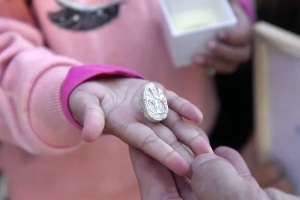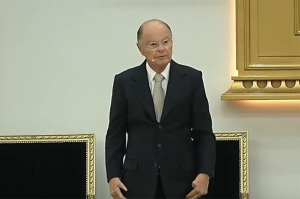Smithsonian Channel Cancels 'Jesus' Wife' Documentary After Scholarly Rebuke
The Smithsonian Channel has announced that it will postpone a previously planned documentary for the "Jesus wife" papyrus after a leading Vatican newspaper joined theologians and scholars in suggesting that the text is possibly a fake.
"The Gospel of Jesus's Wife," the title of the documentary that was planned for Sept. 30, was being advertised as "one of the most significant discoveries of all time," by the Smithsonian Channel, but the website now says that the program is "not currently airing," giving no indication if or when it will air. A spokesman for Smithsonian has also noted that the program will be postponed "until the text undergoes further tests," The Washington Post reported.
The controversial papyrus was unveiled in September by Professor Karen King of Harvard Divinity School. King has claimed the papyrus is the only existing ancient text in which Jesus supposedly refers to having a wife, presumably by the name of Mary. Some of the translated passages from Coptic text include: "Jesus said to them," "My wife …" and "she will be able to be my disciple …" King has said that the document is possibly an early 2nd century document excavated in upper Egypt, and noted that she appreciates the discussion on the subject.
"The aim of this analysis is not to reconstruct the historical Jesus, that is, to argue whether the historical Jesus had a wife or was celibate," King wrote in an analysis to be published in the January edition of the Harvard Theological Review. "Nor do I argue that historically there is any evidence that if Jesus was married, it was to Mary Magdalene. She appears in the most reliable historical information as a prominent disciple of Jesus."
Christian theologians and scholars, however, have largely dismissed the papyrus, and have said that it is likely the supposed ancient find was forged.
"This is sensationalism masquerading as scholarship," said R. Albert Mohler, president of The Southern Baptist Theological Seminary. "One British newspaper notes that the claims about a married Jesus seem more worthy of fans of Dan Brown's fictional work, The Da Vinci Code, than 'real-life Harvard professors.' If the fragment is authenticated, the existence of this little document will be of interest to historians of the era, but it is insanity to make the claims now running through the media."
Furthermore, L'Osservatore Romano, a Vatican newspaper, published an article in which Alberto Camplani, a leading scholar on Coptic documents, also said that the papyrus was probably fake.
"In spite of the drift in the media marked by tones which are quick to shock, unlike so many other items presented at the conference, the papyrus was not discovered in the process of excavation but came from an antiquarian market," Camplani wrote. "Such an object demands that numerous precautions be taken to establish its reliability and exclude the possibility of forgery."
Camplani noted that the text needs to be examined further, but even in the unlikely scenario that it is proven to be a legitimate historical document, it could not be seen as definite proof that Jesus was married. The Vatican scholar explained that Jesus' remarks referring to "my wife" could be referring to the Church, which is commonly used as a symbolic parallel in the Bible.





























